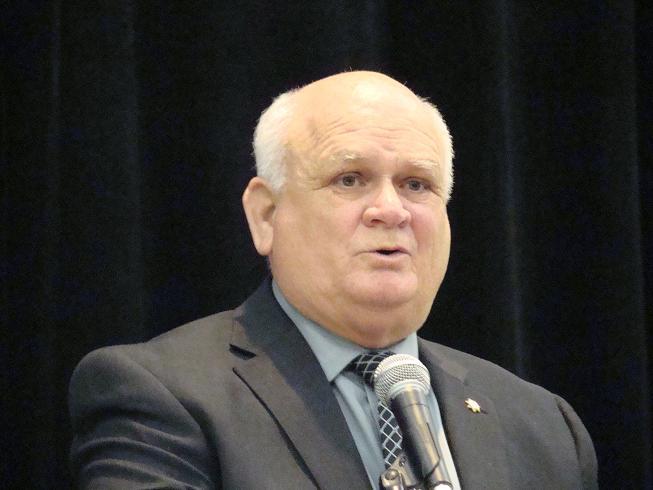Measures to identify, stop Calif. grease thieves in their tracks




Photo: Ron Kotrba, Biodiesel Magazine
January 28, 2014
BY Ron Kotrba
Grease theft has been a hot-ticket item of concern in the rendering and biodiesel industries ever since the value of this raw material began rising with increased biodiesel production. In a high market, opportunists and bootleggers are responsible for the loss of 40 to 50 percent of inedible kitchen grease (IKG) product, according to David Isen, asset protection manager for Imperial Western Products, who spoke on an IKG theft panel at the California Biodiesel and Renewable Diesel Conference in San Diego last week. In a low market, Isen said 20 to 30 percent of IKG is lost to grease thieves.
Isen said there are two types of grease thieves in California: those licensed by the California Department of Food and Agriculture, which are opportunists and account for only 20 percent of stolen grease; and the unlicensed bootleggers, which account for the lion’s share of 80 percent of stolen product—where the real threat lies.
Not only do grease thieves steal IKG from containers owned by legitimate businesses, but Isen warned some go to extremes by highjacking whole containers and repainting them to try covering their tracks. They employ tactics to cut, damage or destroy containers, or even buy container keys from competitors, to illegally obtain product.
He offered tips to help identify habitual grease thieves in California. Watch for an expired or fake IKG sticker on their truck or no sticker at all. Their trucks will also often lack company signage and a California business license number. Grease thieves can also be spotted by their dirty and atypical collection vehicles, and may be lacking a TK or TL sticker indicating it’s a licensed truck or trailer. Isen also said to be wary of collectors operating between the hours of 2am and 6am.
Advertisement
Isen spoke of the “Stop Grease Theft Now” program, which plans to disseminate the message on highway billboards offering $500 rewards for information leading to the arrest of individuals responsible for stealing IKG.
“File police reports,” Isen said to anyone hit by grease thieves, “because this is not a victimless crime.”
Paul Roos, a special investigator for the CDFA, said victims include legitimate haulers, restaurants, passersby who may slip on the mess left behind, and the environment, to mention a few. The CDFA has an IKG crime reporter website, which the panelists encouraged people to utilize.
Isen said businesses can use GPS and tracking cameras to help protect their assets, and improved communication between licensed companies, and a call to action from legitimate grease haulers, are highly recommended.
Advertisement
Dwight O. “Spike” Helmick Jr., a retired California Highway Patrol commissioner, said legislation has been drafted and will be introduced this year in the California assembly in Sacramento, to give law enforcement the tools they need to help stop grease theft.
Existing law already requires licensed renderers to record and keep paperwork for two years, including specific information such as name, address and registration number of IKG transporters that have made deliveries. The draft legislation intends to increase the penalties for noncompliance (lack of records or lack of willingness to produce records upon demand from law enforcement) from $500, $1,000 and $2,000 for first, second and third offenses, respectively, to $1,000, $2,000 and $10,000.
Currently the transport of IKG without CDFA registration, and without being in possession of a valid registration certificate issued by the department, is prohibited. The draft legislation would require possession of a manifest for the IKG being transported.
The draft bill would also authorize law enforcement to remove a vehicle if it is involved in the theft or movement of stolen IKG, or if the vehicle is transporting IKG without being properly licensed. It authorizes police to seize and impound any vehicle involved in theft or transportation of stolen IKG after citation or arrest, for up to 30 days. “After 30 days at $150 a day, the intent is to get these vehicles off the road,” Helmick said.
Finally, the draft legislation would require every vehicle transporting IKG to display both a specified decal and certain information on the front doors of the vehicle.
Related Stories
The USDA significantly increased its estimate for 2025-’26 soybean oil use in biofuel production in its latest World Agricultural Supply and Demand Estimates report, released July 11. The outlook for soybean production was revised down.
U.S. fuel ethanol capacity fell slightly in April, while biodiesel and renewable diesel capacity held steady, according to data released by the U.S. EIA on June 30. Feedstock consumption was down when compared to the previous month.
The U.S. EPA on July 8 hosted virtual public hearing to gather input on the agency’s recently released proposed rule to set 2026 and 2027 RFS RVOs. Members of the biofuel industry were among those to offer testimony during the event.
The USDA’s Risk Management Agency is implementing multiple changes to the Camelina pilot insurance program for the 2026 and succeeding crop years. The changes will expand coverage options and provide greater flexibility for producers.
The USDA’s National Agricultural Statistics Service on June 30 released its annual Acreage report, estimating that 83.4 million acres of soybeans have been planted in the U.S. this year, down 4% when compared to 2024.
Upcoming Events










